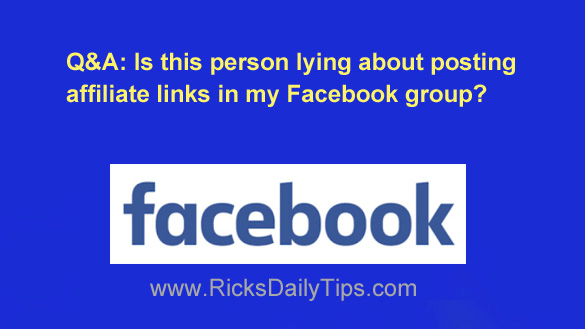 Question from Jill: Hi Rick, I’ve just joined your Rick’s Tech Tips Facebook group and already have learned so much!
Question from Jill: Hi Rick, I’ve just joined your Rick’s Tech Tips Facebook group and already have learned so much!
I have a Facebook question. I don’t know if it is within your scope, but here goes.
I’m an admin on a group and from time to time one of the members posts links for things like Psychic Reading pages and similar things.
These links appear to be affiliate links and I think the person posting them receives some type of payment.
However there is a message going round that these posts are not in fact coming from that person but are somehow being sent by a third party purporting to be the member. And that’s what the person posting the links is claiming too.
If she is indeed posting these links I plan to remove her and block her from the group.
So my question is, is it possible that she’s telling the truth or is this just an excuse she’s using after having been caught?
The reason I ask is this person has been a member in good standing for many years and this issue only arose within the past few months. Overall she has been a real asset to the group.
Rick’s answer: Hi Jill, and welcome to my tech group!
To answer your question, a user that says someone else is using his/her account to post disallowed affiliate links to the group could well be telling you the truth. More on that in a moment…
The above being said, lots of folks do join Facebook groups with the intention of posting affiliate links to the group as a way to make money at the group owner’s expense.
If someone clicks on their affiliate link and makes a purchase, the person that posted the link earns a commission on the sale. That’s one possibility.
One possible reason this person could be telling the truth is a hacker could have stolen her login credentials and is using them to log into her account and post affiliate links in her name while collecting the commissions himself.
The first thing I would do is ask the group member in question to change her password to one that’s strong, yet easy to remember and then enable Two-Factor Authentication on her account.
If someone is actually logging into her account and posting those links in her name, the actions mentioned above will put a stop to it in a hurry.
But there’s also another real possibility you need to consider…
It’s also fairly common for Facebook users to have malicious apps enabled on their accounts (without their knowledge) that post affiliate links in their name.
Any commissions earned via clicks on those links go to the creator of the malicious app, not the innocent user whose account is being exploited by the app.
When situations like this arise with my group (and they do on occasion), I handle them like this…
If the user admits to posting disallowed affiliate links to my group I tell them to stop. If they keep posting them I simply ban them from the group.
If they say someone else must be posting the links in their name I tell them to check the apps that are enabled on their account and disable any they are unfamiliar with and/or never use.
I then send them the link to this post that explains how to view all the apps that are enabled on their account and delete the ones that need to be deleted.
If their account continues posting disallowed affiliate links after they’ve been warned, I ban them from the group because I can’t allow those types of links to impact the other group members.
And now, one final note…
Everything I said in my answer applies to people (or illegitimate apps) that post affiliate links directly to the group. That’s considered a no-no by pretty much everyone I know.
However, many groups allow their members to post links to blog posts/web pages that contain affiliate links as long as the post itself offers some benefit to the other group members. I just felt that I needed to point out that distinction.
I hope this helps, Jill. Good luck!